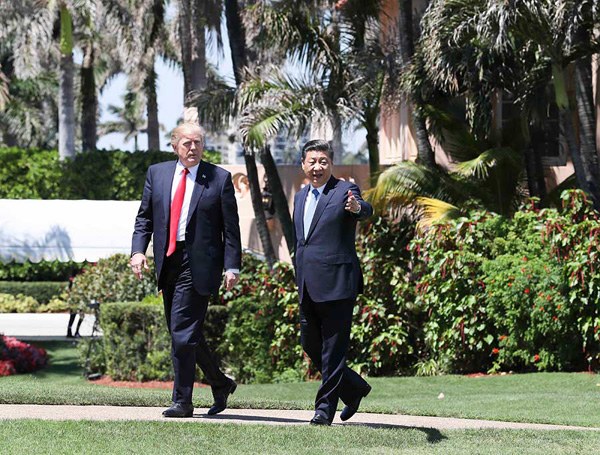
Chinese President Xi Jinping (R) and his US counterpart Donald Trump (L) take a walk to further discuss bilateral cooperation issues in the Mar-a-Lago resort in Florida, the United States, April 7, 2017. (Photo/Xinhua)
President Xi Jinping and his U.S. counterpart Donald Trump recently held an important meeting at Mar-a-Lago, Florida, which drew the attention of the international community for several reasons.
First, the two leaders reached a strategic consensus on the future of Sino-U.S. relations based on the principle of no confrontation, no conflict, mutual respect and win-win cooperation. Within this framework, they initiated a comprehensive dialogue mechanism that includes diplomatic and security dialogue, comprehensive economic dialogue, law enforcement and cyber security dialogue, and dialogue on social and people-to-people exchanges.
Before the meeting, there were uncertainties, even worries, about the direction the China-U.S. relationship would take after Trump became U.S. president and given the burning issues of the U.S.' trade deficit, the yuan's exchange rate, and the Korean Peninsula nuclear issue and the South China Sea. The reality is, China and the U.S. have plenty of converging interests, both bilateral and international, despite not seeing eye-to-eye on everything. The key to a steady and sound relationship is reaching a comprehensive strategic understanding of the overall direction of bilateral ties, instead of being obsessed with one single issue.
Second, the Mar-a-Lago meeting, where the two leaders compared notes on each other's development strategies and agreed to expand cooperation on various economic and financial issues, has contributed to keeping Sino-U.S. economic ties on an even keel and given the world economy a much-needed helping hand. That the two largest economies have agreed to strengthen economic cooperation, instead of fighting trade wars, is in itself no small feat.
The agreements the two sides reached on cooperative measures in bilateral and global economic fields are impressive, because they were achieved against the backdrop of faltering global growth, increasing financial risks amid high turbulence in global capital movement and rising protectionism in some advanced economies.
It seems Trump's "America First" policy does not necessarily mean "China Last". In fact, his "America First" policy can succeed only through cooperation with China.
U.S. officials have often mentioned their country's trade deficit ($347 billion last year) to highlight the imbalance in China-U.S. trade. But deficit and surplus are the two parts of trade, and the U.S. has to find ways to reduce it and restore the balance in trade, rather than adopting a protectionist trade policy.
Xi said at Mar-a-Lago that the two countries, among other things, should consider deepening cooperation in infrastructure construction and energy. In infrastructure, China has the advantage of capital, equipment and capability, and therefore can help the U.S. to improve its infrastructure. On the energy front, the U.S. could export shale oil and gas to China that has a huge demand for energy. Besides, the U.S. ought to consider lifting the ban on exports of dual-use goods to China.
And third, the two leaders paid special attention to regional security and world peace. Media reports say Xi and Trump talked at length about regional security, including the Korean Peninsula nuclear issue.
Therefore, it is not a good sign that the U.S. is talking about a military resolution to the peninsula issue and has moved extra military equipment and personnel, including aircraft carrier groups, into the waters near the peninsula. The U.S. should realize saber rattling will only lead to war not peace.
We strongly urge all parties to stop taking actions that will compromise regional security. We also urge them to seriously consider China's recent proposal of "dualsuspension" to create conditions for restarting negotiations, especially the Six-Party Talks.
East Asian countries, as well as those countries that have interests in the region need to adopt Xi's new security concept based on cooperative and comprehensive security, rather than seeking absolute security at the expense of others.
The Mar-a-Lago meeting has provided guidance on how to manage China-U.S. relations and drawn a clear road map to achieve this goal. The tone and direction have thus been set and now we need to "roll up our sleeves" to concretize the work cut out for us at the meeting.
The author He Yafei is a former vice-minister of Overseas Chinese Affairs Office of the State Council, and former vice-minister of Chinese Ministry of Foreign Affairs.


















































